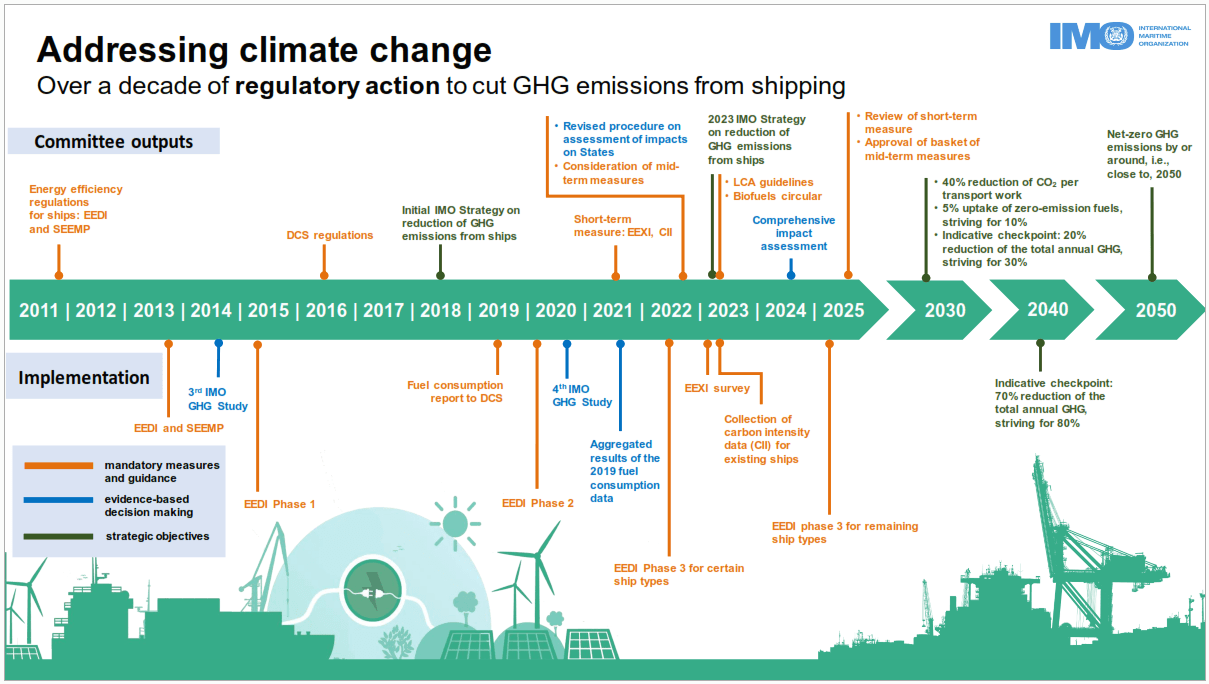IMO 2025 Regulation Updates: Key Changes Affecting Global Shipping and Compliance

The International Maritime Organization (IMO) has entered a new phase of regulatory tightening aimed at achieving its net-zero greenhouse gas (GHG) emissions target by 2050. With several amendments and new conventions coming into effect in 2025, shipowners, operators, and technical managers must prepare for a more complex compliance landscape.
Below is a detailed summary of the most impactful IMO updates for 2025 and their practical implications for vessel operations, maintenance, and repair activities.
1. Mediterranean Sea Becomes a Sulphur Emission Control Area (SECA)Effective 1 May 2025, the entire Mediterranean Sea will officially become a Sulphur Emission Control Area (SECA) under MARPOL Annex VI [1].
This means that the sulphur content in marine fuels will be limited to 0.10%, aligning the region with existing ECAs such as the Baltic, North Sea, and North American zones.
Impact on operators:
- Higher fuel costs due to low-sulphur or alternative fuel requirements.
- Increased importance of fuel change-over procedures before entering the SECA zone.
- Demand for fuel system cleaning, tank inspections, and fuel quality testing, especially for older vessels.
- Ship repair companies like RMS must be ready to assist with fuel line adjustments, filter replacements, and exhaust system checks.
On 26 June 2025, the long-awaited Hong Kong International Convention for the Safe and Environmentally Sound Recycling of Ships will enter into force after 15 years of ratification efforts [2].
Key points:
- All ships of 500 GT and above must carry a valid Inventory of Hazardous Materials (IHM) certificate.
- Shipowners are required to update the IHM throughout the vessel’s lifetime.
- Ship recycling facilities must be authorized and audited under IMO standards.
For repair and maintenance providers, this increases the need for hazardous material management, asbestos removal supervision, and IHM Part II & III updating services.
3. MARPOL Annex VI New Amendments for Low-Flashpoint Fuels & BDNAmendments adopted by MEPC 81 and 82 will take effect in 2025 [3], tightening documentation and safety requirements for low-flashpoint fuels such as methanol, LPG, and LNG.
What changes:
- Bunker Delivery Notes (BDN) must include flashpoint data and verification method.
- Ship operators must ensure fuel system design and storage tank ventilation meet updated SOLAS and MARPOL provisions.
- Crew familiarization and emergency drills for alternative fuels become mandatory.
This opens a new domain for engine and automation specialists for instance, calibration and testing of methanol ready systems and upgrading monitoring sensors.
4. Ballast Water Record Book (BWRB) Format RevisionAs of 1 February 2025, IMO’s revised Ballast Water Record Book format will be mandatory under the Ballast Water Management (BWM) Convention [4].
Operator implications:
- All BWRBs must follow the new standardized structure.
- Port State Control (PSC) inspectors may reject outdated log formats.
- Digital systems (e.g., electronic logbooks) must be updated accordingly.
Repair companies offering automation or data-logging upgrades (such as RMS Ship Repair’s onboard calibration service) will play a crucial role in helping operators maintain compliance.
5. IMO’s Net-Zero Framework: Carbon Intensity and Fuel GHG LimitsAlthough still under discussion, IMO’s Net-Zero GHG Framework anticipated through MEPC 83 (2025) will expand existing EEXI, CII, and SEEMP mechanisms [5].
The organization is expected to introduce:
- Fuel GHG Intensity limits (FGI) to cap lifecycle carbon content,
- A global carbon pricing system or credit mechanism,
- Enhanced data collection via DCS (Data Collection System) with transparency requirements.
These measures will shift focus from design-based efficiency to real time operational performance, forcing ship managers to monitor energy efficiency continuously.
Practical Challenges AheadThe 2025 framework creates both compliance pressure and opportunity:
- Rising demand for retrofit projects (scrubbers, MGO conversion, methanol preparation).
- Increased inspection frequency and PSC scrutiny.
- Higher operational costs due to alternative fuels and documentation updates.
For technical service providers like RMS Ship Repair, the key is flexibility being ready with 24/7 mobile teams, class-approved welders, and rapid response units to help owners adapt smoothly without costly downtime.
RMS Perspective: On Time, On Site, On Your SideAs the regulatory tide rises, the difference between compliance and delay often depends on technical readiness. RMS continues to support vessel operators with:
- Class-approved steel and piping renewals,
- Automation upgrades aligned with BWM and MARPOL requirements,
- Certified rider teams ready for voyage repairs across Turkish waters,
- Consultancy for IHM updates and compliance documentation.
With strong local presence in Tuzla, Yalova, and Blacksea Region RMS remains committed to delivering fast, reliable, and compliant repair solutions.
References[1] BIMCO, Mediterranean SECA Implementation 2025, 2025
[2] UK P&I Club, IMO Regulatory Update 2025 – Hong Kong Convention, 2025
[3] Lloyd’s Register, Annex VI Amendments for Low-Flashpoint Fuels, 2025
[4] UK P&I Club, Ballast Water Management Convention Update, 2025
[5] IMO, MEPC 83 – Net-Zero Framework Progress Report, 2025

